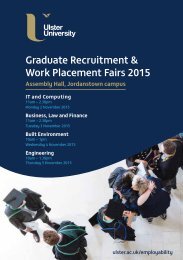Public Attitudes to Peace Walls (2015)
1RRkqqy
1RRkqqy
Create successful ePaper yourself
Turn your PDF publications into a flip-book with our unique Google optimized e-Paper software.
<strong>Public</strong> <strong>Attitudes</strong> <strong>to</strong> <strong>Peace</strong> <strong>Walls</strong> (<strong>2015</strong>)<br />
Survey Results<br />
Ulster University<br />
the community <strong>to</strong> freely celebrate its own culture, while 29% believe that their culture would<br />
disappear entirely without the protection of a wall. Among Catholics, by comparison, only 20%<br />
believe that a wall is required <strong>to</strong> protect the free celebration of culture, and 8% believe that it is<br />
necessary for the survival of their culture. This confirms that fears about cultural diversity are<br />
important drivers in the debate around peace walls, shaping social and economic circumstances,<br />
especially among Protestants.<br />
Furthermore 21% believe that the walls make people feel more trapped, although more Catholic<br />
participants (61%) felt that peace walls send out a bad image of Northern Ireland abroad than<br />
Protestants (44%). There was some evidence that younger people feel more inconvenienced by<br />
the wall, with 29% of 18-34 year olds believing that the wall makes access <strong>to</strong> services harder<br />
compared <strong>to</strong> 18% of those over 55.<br />
Although very few believe that there has been any economic benefit in the area since the peace<br />
process, 53% of Protestants and 48% of Catholics remain convinced that the walls are a <strong>to</strong>urist<br />
attraction. However, 39% of all respondents believe that the peace wall reduces local investment<br />
(Table 13).<br />
Table 13: How much do you agree or disagree with each of these statements about the positive and negative<br />
impact of <strong>Peace</strong> <strong>Walls</strong> in your area? (table reflects agree/strongly agree comments)<br />
Total<br />
(%)<br />
Protestant<br />
(%)<br />
Catholic<br />
(%)<br />
The <strong>Peace</strong> Wall is necessary for me <strong>to</strong> celebrate my culture freely 27 45 20<br />
The <strong>Peace</strong> Wall s<strong>to</strong>ps my community expanding 25 24 27<br />
The <strong>Peace</strong> Wall reduces investment in my area 39 36 41<br />
The <strong>Peace</strong> Wall sends out a bad image of Northern Ireland <strong>to</strong> people<br />
abroad<br />
55 44 61<br />
Without the <strong>Peace</strong> Wall our community would disappear 15 29 8<br />
The <strong>Peace</strong> Wall makes it harder <strong>to</strong> access some services like health,<br />
education or leisure<br />
23 24 21<br />
The <strong>Peace</strong> Wall is a <strong>to</strong>urist attraction 49 53 48<br />
The <strong>Peace</strong> Wall makes people feel trapped 21 20 21<br />
<strong>Peace</strong> walls have come <strong>to</strong> function as a protection against perceived chronic cultural threats as<br />
well as immediate threats <strong>to</strong> security, with wider political issues at stake in their removal. The<br />
existence or removal of peace walls has become entangled within wider challenges such as the<br />
legacy of the past, expressions of culture and identity, and the feared implication of a shared<br />
future in practice. Thus, perceived threats <strong>to</strong> survival on a particular interface may have regional<br />
political importance while, simultaneously, local public confidence in interface areas that might<br />
equate <strong>to</strong> support for any process <strong>to</strong> remove the walls is potentially defined by macro-political<br />
events.<br />
16




